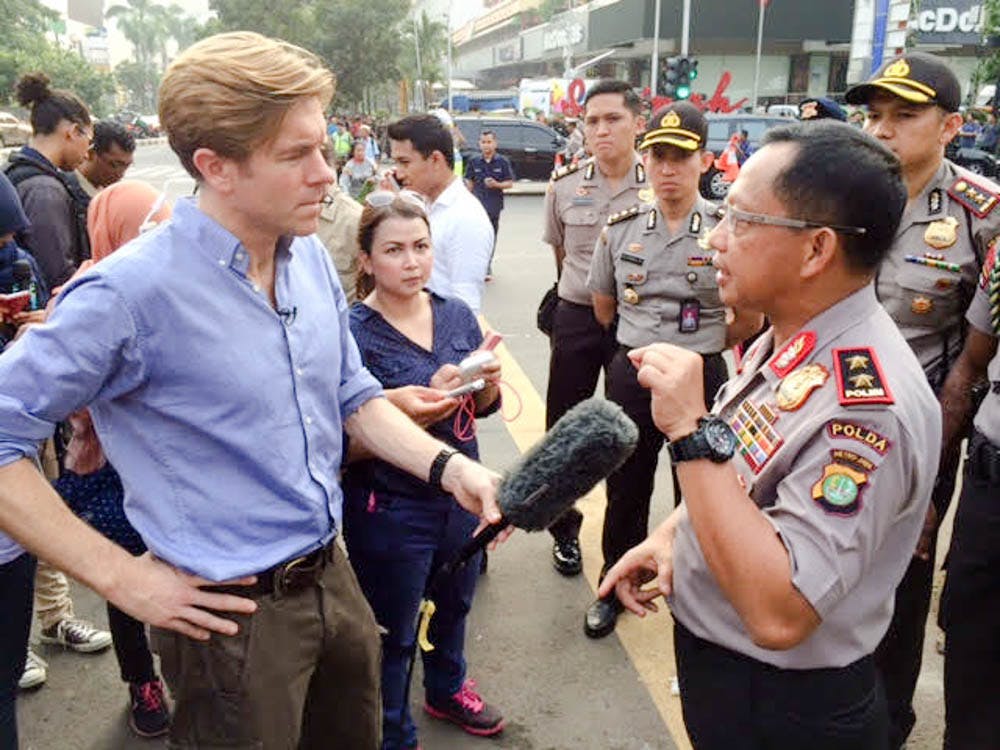“Brown was an intellectual playground, and sometimes my job feels like that,” said Ivan Watson ’97, a senior international correspondent based in Hong Kong for CNN.
As an experienced journalist, Watson has covered breaking news across the globe since the ’90s. He has covered Hong Kong’s Umbrella Revolution, the Port-au-Prince earthquake in Haiti and Typhoon Haiyan in the Philippines — experiences that have forced him into politically controversial and life-endangering situations. Specializing in Asia and the Middle East, Watson also ventured into rebel-controlled regions of Syria, documented ISIS terrorism in Iraq and last month flew into North Korea, where the regime recently fired ballistic missiles into the Sea of Japan.
Watson, who concentrated in international relations at Brown, attributed his curiosity and fascination with “the broader world” to his undergraduate experience at Brown.
“Brown encouraged a sense of creativity but also had an academic rigor,” Watson said. His time at Brown taught him how to translate his energy into productive endeavors — a skill he uses every day at his job, he said.
Uncovering anecdotes and exploring countries are some of the most rewarding aspects of journalism, Watson said. But being a journalist is not all fun and games. “Packing my bags and going to the airport is like going to the office for me,” he said. “At times, it’s very frustrating to dump my personal life and the plans I’ve made.”
But these frustrations become trivialities when compared to risks abroad. In disaster zones, where food, shelter and electricity are scarce, even surviving alone is a challenge, he said. In the toughest of situations, these struggles are accompanied by fears of being greeted with suspicion and being kidnapped, along with the responsibility of taking care of the media production team that travels with Watson.
While abroad, Watson said he must be wary about how to protect the local people he interviews. He traveled to Thailand in February to interview dissidents who fled from China due to the Chinese government’s crackdown on communist critics. To this day, China searches for and arrests dissidents who remain on the mainland, as well as those who have fled the country and now hide in locations like Thailand. “How do we talk to (dissidents) without putting them in danger?” he said, fearing that his interview may cause someone to “get thrown in prison.” He added that he always confirms with his interviewees if he can publish their stories.
The most emotionally exhausting element of being a journalist is the constant exposure to tragedies and atrocities, Watson said. One night, Watson had to anchor as a substitute and cover “suicide bombing after suicide bombing, from Pakistan to Brussels. It’s horrific,” he said.
“I would much rather do a story that celebrates the world and what’s amazing about it than cover a natural disaster that’s killed tens of thousands of people,” he said. “I wish I didn’t have to report this stuff.” After a while, “it all starts to look the same,” he said.
At the same time, Watson acknowledges that he stands in a unique position as an international journalist in Asia and the Middle East. His travels to both regions allow him to compare the histories and cultures of countries he visits and reflect on how society could “draw lessons” from certain places and apply them elsewhere, he said.
The Middle East is in a “dark and tragic cycle of history,” but a generation ago, Asia was, too — think of instability in Vietnam, Cambodia, Laos, Korea and China, Watson said. But these countries are “not suffering from these kinds of conflict today,” Watson said. “Could this be hope for (the Middle East) down the road?”





